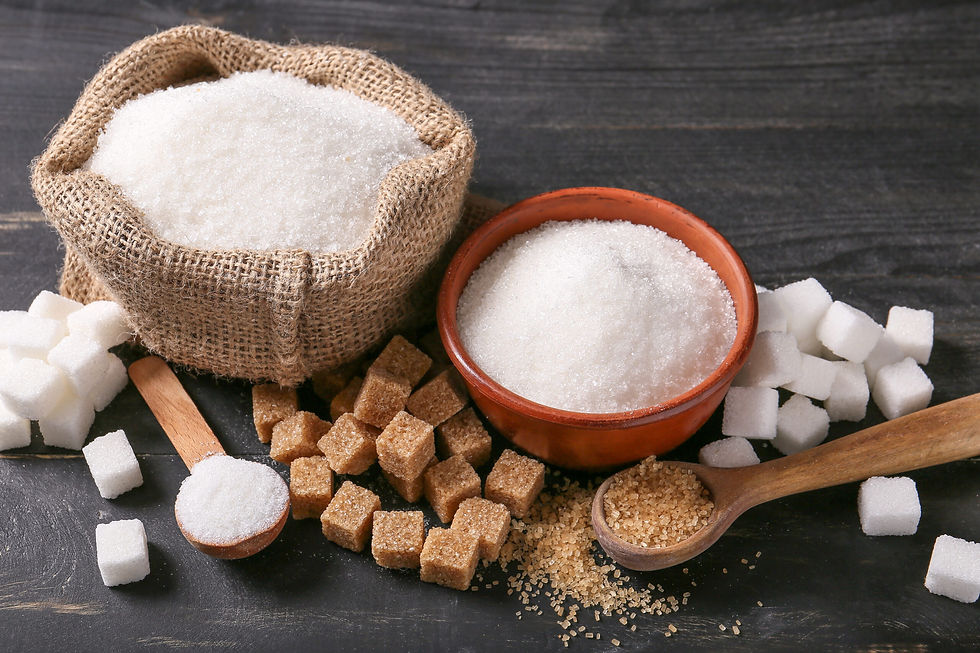The Sweet Debate: Understanding Sugar and Its Impact on Health
- Chef David

- Sep 20, 2024
- 2 min read

Sugar has been a part of human diets for centuries, evolving from a luxury item to a ubiquitous ingredient in processed foods. With the rise of health consciousness, the discussion around sugar—its benefits, risks, and alternatives—has never been more pertinent. This article explores the multifaceted nature of sugar, its health implications, and ways to navigate your sugar intake.
What is Sugar?
At its core, sugar is a type of carbohydrate that provides energy. It exists in various forms, including:
Natural Sugars: Found in fruits (fructose) and dairy products (lactose).
Added Sugars: These are sugars added to foods during processing or preparation, such as sucrose (table sugar) and high-fructose corn syrup.
While natural sugars come with beneficial nutrients and fiber, added sugars often appear in processed foods, where they can contribute to excessive calorie intake without nutritional benefits.
The Health Implications of Sugar
Pros
Energy Source: Sugar is a quick source of energy, vital for immediate physical activity and brain function.
Flavor Enhancer: It enhances the taste of foods, making them more palatable and enjoyable.
Cons
Weight Gain: Excessive sugar consumption is linked to obesity, as sugary foods often contain high calories with little nutritional value.
Chronic Diseases: High sugar intake is associated with an increased risk of type 2 diabetes, heart disease, and dental problems.
Addiction: Some studies suggest that sugar can trigger similar responses in the brain as addictive substances, leading to cravings and overconsumption.
Recommendations from Health Organizations
Health authorities like the World Health Organization (WHO) recommend limiting added sugars to less than 10% of total daily caloric intake. For an average adult, this translates to about 50 grams (or roughly 12 teaspoons) of added sugar per day.
Strategies for Reducing Sugar Intake
Read Labels: Become a savvy consumer by checking food labels for added sugars. Ingredients like sucrose, glucose, and corn syrup are indicators of sugar content.
Choose Whole Foods: Focus on whole, unprocessed foods such as fruits, vegetables, whole grains, and lean proteins, which naturally contain less sugar.
Limit Sugary Beverages: Drinks like soda, energy drinks, and sweetened coffees can contain significant amounts of sugar. Opt for water, herbal teas, or unsweetened beverages instead.
Mindful Eating: Pay attention to portion sizes and be mindful of snacks and treats. Moderation is key.
Experiment with Alternatives: Natural sweeteners like honey, maple syrup, or stevia can be used in moderation as alternatives to refined sugars.
The Role of Sugar in the Food Industry
Sugar plays a crucial role in the food industry—not only for its sweetness but also as a preservative and texturizer. Understanding its multifunctional role can shed light on why it's so prevalent in processed foods.
Conclusion
While sugar can enhance flavor and provide a quick energy boost, moderation is essential. By being aware of the types and amounts of sugar we consume, we can make informed dietary choices that contribute to better overall health. As with many things in life, balance is key. Embracing a varied diet rich in whole foods, while enjoying sweet treats occasionally, can help maintain both health and happiness in our food choices.


Comments